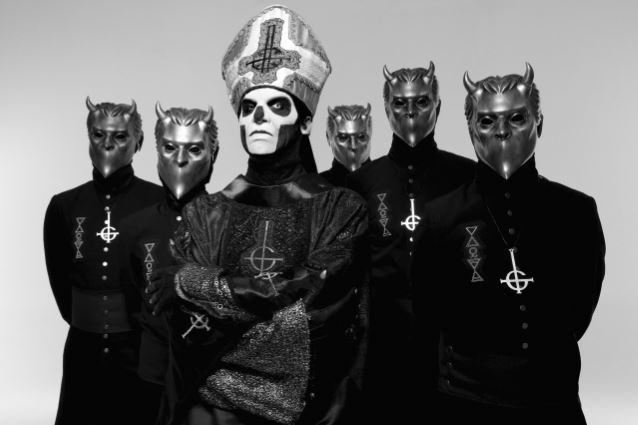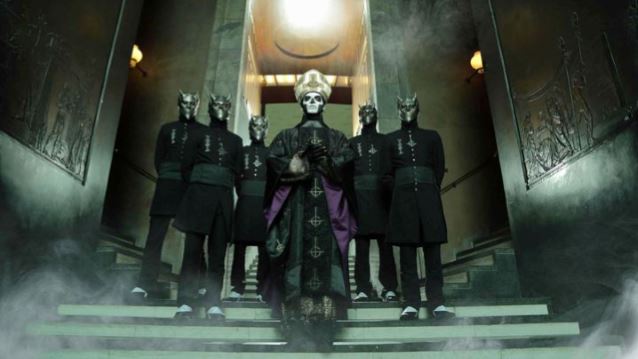Source: Blabbermouth.net
GHOST frontman and founder Tobias Forge, who performs as Papa Emeritus, says that the group was “never formed as a band” and was always essentially a one-man project, with many session musicians coming and going over its seven-year existence.
Earlier in the month, Forge was sued by four ex-members of the Swedish act who accused Forge of cheating them out of their rightful share of the profits from the band’s album releases and world tours. That may have led to Forge‘s wholesale firing of the group at the end of 2016.
The lawsuit was filed just a month after guitarist Martin Persner — who was not one of the four former Nameless Ghouls behind the court action — announced that was a member of GHOST for seven years prior to exiting the band in July 2016.
In an interview conducted by Nicolas Gricourt of France’s Radio Metal on March 28 — less than a week before the existence of the lawsuit was first reported by the Swedish media — Forge was asked how he felt about Persner‘s decision to go public with his identity a little over six months after he left GHOST. Tobias responded: “It was pretty much what I had expected, so it wasn’t like a big shock. There’s not much to say more than that. It was perfectly in line with what I expected.”
Confirming that he didn’t speak with Persner prior to the guitarist’s decison to “unmask” himself, Forge concurred that the move “does, obviously, take away the mystery from [Persner].” But, he added, “That’s fine. That’s perfectly okay.”
Asked if the Nameless Ghouls are, or were, under a contractual obligation to not reveal their identities while they are in GHOST and after they leave the band, Forge said: “Well, I think that one of the mistakes was not putting a lot of pressure on them in doing that. So let’s just say that, obviously, there was no such clause because I thought that was sort of part of the settlement agreement. But it wasn’t. So there was no effective ban on hiding or… there was no ban from revealing your identity.”
Regarding his reasons for replacing the entire GHOST band at the end of 2016, Forge said: “I can’t tell you the whole story, but without going into detail, the one thing that has always been a fact is that GHOST was never formed as a band, and its first lineup was formed after the first record was recorded, and it was just a live lineup. And from that lineup, it changed many times.
“If you’ve followed us from when we started playing live in October 2010, you will notice that there has been numerous changes over the years. And none of the people in the lineup that was in November last year had ever played on [GHOST‘s 2010 debut album] ‘Opus Eponymous’, for example.
“We never formed the band together; it was always sort of… I guess a BATHORY sort of band, where there was people playing live, and the people playing live [were] not necessarily the same that played on the records. On ‘Opus’ and [2015’s] ‘Meliora’, there’s a drummer that has never played with us live, for example. So, from my end, it’s never really been… What some fans seem to think is not true. So, for me, it’s just a matter of… People will… further down the line, they will find out that what they’re saying or what they’re thinking is not correct, is not based upon truth, but that’s fine. It’s okay. No worries.”
Asked if one of the benefits of having an anonymous band was that GHOST could undergo lineup changes without the usual public drama that accompanies such personnel shuffles, Forge said: “Over the years, that has been convenient, obviously. But there’s always chatter. There’s been chatter about new members for years. If you look into the… you know, more of the [online] fan groups, they’ve always noted when there was a new Ghoul. But, yeah, of course, there’s the benefit of… it doesn’t necessarily turn into a media pie-throwing contest, which is nice. Yeah, it helps. But the costumes and everything has also been the band’s curse for all these years, because that is the one thing that gets people confused when it comes to their importance.
“It is difficult to be that band that doesn’t do things the way other bands do it. It’s a blessing and a curse.”
He continued: “I love doing GHOST — it’s fucking great, it’s a great job, the best job in the world — but it definitely comes with a lot of baggage that was… It’s easy to see that now, of course… Getting this or that person into a mask and taking that person out on a world tour, with everything that comes with that, will be a problem, because most people that are sucked into the idea of playing rock music do so because they want to get known and they want to get recognition. I’m no better — I want recognition as well — but I don’t necessarily want it in the form of ‘likes.’ I’m battling human nature here, so it’s… I’ve sort of given up that struggle, that fight you cannot win.”
Pressed about how he manages to keep GHOST‘s signature sound intact when he is changing the entire band or just a part of it, Forge said: “I have to teach them to play how I play it; that’s how I do it. That’s how it always works… Oftentimes the key is to teach them to think more simple. I’m an okay drummer, I’m an okay bass player, I’m an okay keyboardist, and I’m a quite good guitar player. And the trick is just to get them to underperform [laughs] together. And that helps if you have instrumented everything. Because my way of bass playing is all over the bass playing, my way of drumming is all over the drumming, and my form of keyboard playing is all over the keyboards, so the only thing I have to teach is, like, ‘This is how you play this riff.’ ‘But it’s so easy.’ ‘Yes, that’s the point.’ I mean, it’s time consuming, of course — it’s time consuming when you have to teach everyone to, sort of, adopt a style, but that’s how it started.”
He added: “As I was saying, ‘Opus Eponymous’ was recorded with a session drummer and nothing else. So that sort of set a tone — this is how it sounds, and this is how it’s supposed to sound, and that’s what it has been developing from. And that in itself becomes a little bit of a… It’s both a blessing and a curse again.”
The GHOST lawsuit, filed in the district court of Linköping, Sweden, where the band was originally based, claims that Forge solely controlled the group business affairs without input from anyone else in the band, while also carrying out management duties. The four musicians are asking the court to order Forge to disclose GHOST‘s revenues and expenses for the financial years 2011 to 2016 and reveal the company’s assets as of December 31, 2016.
If Forge fails to act as ordered, the musicians are asking the court to force Forge to pay a penalty of approximately $22,000 or an amount that the court considers reasonable.
The lawsuit alleges that Forge has been collecting all revenues from sales of the band’s merchandise and recordings since the band was formed in 2010, and has insisted that the “company” was not yet profitable while at the same time refusing to disclose financial statements.
The situation allegedly became dire in 2012, when the band members did not receive any compensation at all. Forge was finally pressured to pay them, which he did only sporadically while still claiming that the band was broke.
The four musicians were allegedly offered two separate contract proposals by Forge in 2016, which they rejected as “slave agreements.”
In a statement explaining the lawsuit, the musicians officially revealed their identities as Simon Söderberg (Alpha; member of GHOST from 2010 until 2016), Mauro Rubino (Air; member of GHOST from 2011 until 2016), Henrik Palm (Eather; member of GHOST from 2015 until 2016) and Martin Hjertstedt (Earth; member of GHOST from 2014 until 2016).
The new lineup of GHOST is rumored to include musicians who have previously played with THE SISTERS OF MERCY, KORN, PENDRAGON and BLOODBATH.
[Special thanks to Nicolas Gricourt and Radio Metal for providing BLABBERMOUTH.NET with the original English-language audio from which the above quotes were transcribed.]


